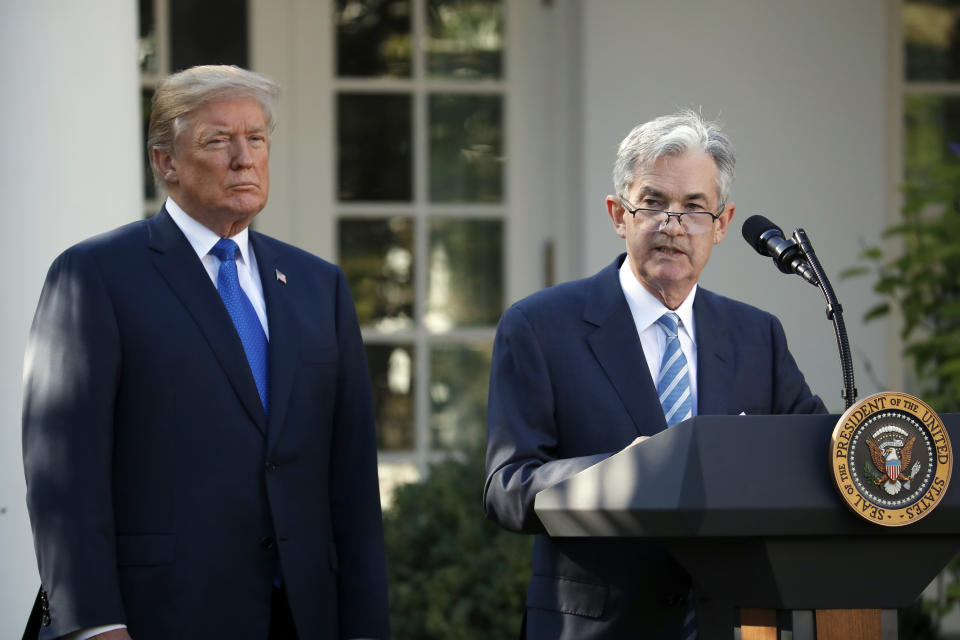'Tightening now hurts all that we have done': Trump rails against the Fed for a second day
President Donald Trump is no fan of the Federal Reserve’s current monetary policy.
And on Friday morning, Trump tweeted his displeasure about recent decisions by the central bank to raise its benchmark interest rate target, bringing his public disagreements with Fed action into a second day.
“The United States should not be penalized because we are doing so well,” Trump said in a tweet Friday morning.
“Tightening now hurts all that we have done. The U.S. should be allowed to recapture what was lost due to illegal currency manipulation and BAD Trade Deals. Debt coming due & we are raising rates – Really?”
….The United States should not be penalized because we are doing so well. Tightening now hurts all that we have done. The U.S. should be allowed to recapture what was lost due to illegal currency manipulation and BAD Trade Deals. Debt coming due & we are raising rates – Really?
— Donald J. Trump (@realDonaldTrump) July 20, 2018
Of course, Trump’s signature economic policy — the Tax Cut and Jobs Act passed in late 2017 — came with an near doubling of the government’s borrowing in 2018 to $955 billion. The government is forecast to borrow more than $1 trillion dollars in each of the next two years. In 2017, the last fiscal year before the passage of Trump’s tax cut, the government borrowed $519 billion.
Since Trump was elected president, the Federal Reserve has raised interest rates six times and is forecast to raise rates twice more this year.

In an earlier tweet sent Friday morning, Trump complained about what he believes is currency manipulation from both China and the EU.
“China, the European Union and others have been manipulating their currencies and interest rates lower, while the U.S. is raising rates while the dollars gets stronger and stronger with each passing day – taking away our big competitive edge,” Trump said.
“As usual, not a level playing field.”
The Chinese yuan and the euro have both lost value against the dollar this year, though in 2017 the dollar had its worst year since 2003.
Friday’s tweets from Trump comes after a clip of his interview with CNBC that aired Friday morning was released Thursday afternoon in which the president says he isn’t thrilled with the Fed’s current policy stance.
“I’m not thrilled,” Trump said in his interview with CNBC. “Because we go up and every time you go up they want to raise rates again. I don’t really — I am not happy about it. But at the same time I’m letting them do what they feel is best.”
Trump added that his displeasure with the Fed raising rates reflects how he would feel as a private citizen.
In a statement following Trump’s comments to CNBC, the White House said, “[Trump] considers the Federal Reserve Board Chair Jerome Powell a very good man and that he is not interfering with Fed policy decisions… The President’s views on interest rates are well known and his comments today are a reiteration of those long held positions, and public comments.”
Last year, Trump said in an interview with the Wall Street Journal that he does favor a low interest rate policy, though ahead of the 2016 election suggested that the Fed was keeping rates low in an effort to help then-President Barack Obama.
And while Trump’s commentary on interest rates and the Fed Friday morning was framed around his displeasure with key U.S. trading partners and their currency policy, he is being very frank about his preferences for how the Federal Reserve conduct its monetary policy.
Whether Fed chair Jerome Powell listens is another question.
The Fed’s political independence is a defining feature of the central bank that in theory allows it to conduct monetary policy away from short-term political pressures and respond instead to long-term economic trends.
—
Myles Udland is a writer at Yahoo Finance. Follow him on Twitter @MylesUdland

 Yahoo Finance
Yahoo Finance 
